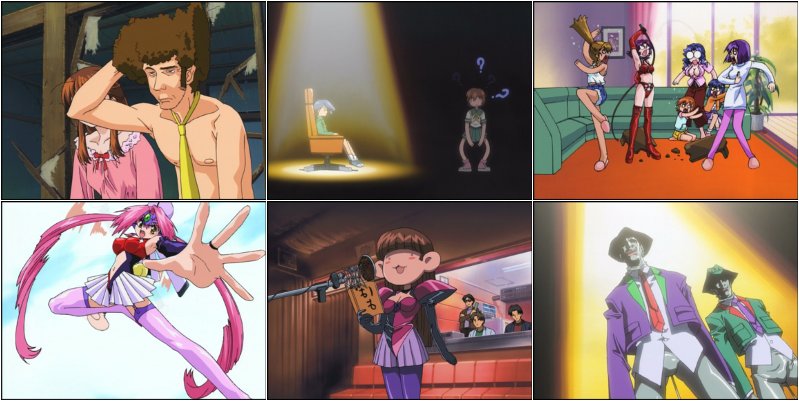
A lot of shows this decade have made with the self-referential humour about anime and anime fandom. The most popular is probably student film episode of The Melancholy of Haruhi Suzimiya, which seemed almost sharp in the first episode, but was undermined by the rest of the show. Ultimately, like so many of these shows, it was proved to be toothless. Scared of offending the audience it’s mocking, because they are also the audience for the show.
It’s basically the Japanese cartoon equivalent of something like a Dork Tower. It’s all “Ho! Ho! We are like that” humour – designed to comfort, rather than confront, through the identification.
So thank fuck for Shinichi Watanabe, the man they call Nabeshin, and his 2001 OAV series Puni Puni Poemy.
Outside of his later Nerima Daikon Brothers, a musical satire, it’s the purest illustration of his worldview available. Compared to the sort of shows I mentioned above, this is far more abrasive, akin to Evan Dorkin’s Eltingville Club in its brutal satire of excess. Or possibly Johnny Ryan’s Comic Book Holocaust is a better comparison, as Watanabe’s trick here, like in the non-TV broadcast Excel Saga episode, is take anime industry standards and turn them into grotesque exaggerations.
Episode one lures you somewhat into a false sense of security, even with trouserless aliens with pendulous giant testicles, a magical girl who is so stupid she refers to herself by her voice actress’ name and a family of sisters, each of whom fulfils some fetish in the most extreme way possible, it’s fairly subdued stuff compared to the second and final episode.
There the show goes full bore in grotesquely parodying pornographic anime and videogame material. We discover that Poemy’s crush and classmate is actually an alien, who believes that Japanese Culture is all rape, maids, tentacles and bondage. And that like him, THIS IS WHAT YOU WANT!
Except in New Zealand of course, where the show is banned.
Of course, it’s kind of bothersome that everything Puni Puni Poemi goes after, just got more pervasive in the 8 years that followed, but never as truly self aware. Now we can look at it as a warning from history, that no one listened to.